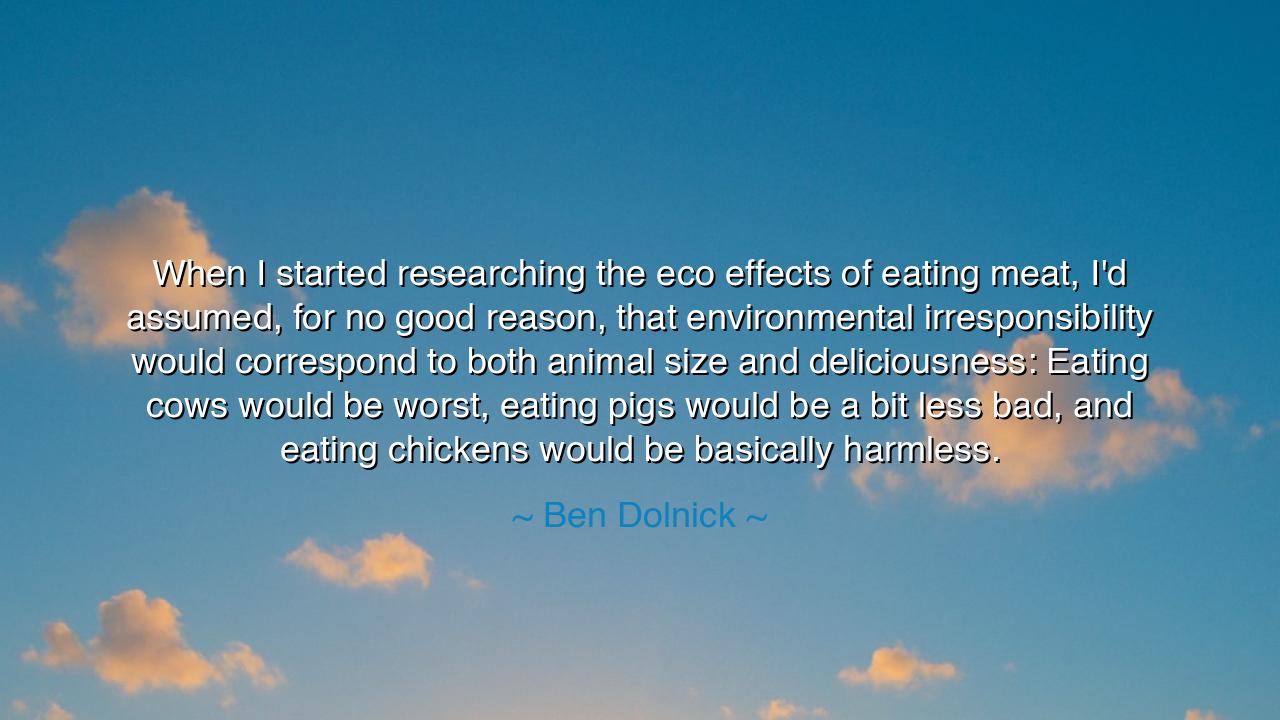
When I started researching the eco effects of eating meat, I'd
When I started researching the eco effects of eating meat, I'd assumed, for no good reason, that environmental irresponsibility would correspond to both animal size and deliciousness: Eating cows would be worst, eating pigs would be a bit less bad, and eating chickens would be basically harmless.






The words of Ben Dolnick—“When I started researching the eco effects of eating meat, I'd assumed, for no good reason, that environmental irresponsibility would correspond to both animal size and deliciousness: Eating cows would be worst, eating pigs would be a bit less bad, and eating chickens would be basically harmless.”—reveal the awakening of a mind once content with easy assumptions, now humbled by truth. In this reflection lies a profound journey: the passage from ignorance to awareness, from instinct to understanding. It is a story as old as humankind—the realization that comfort often blinds us to consequence, and that behind every act of pleasure or convenience lies an unseen chain of cause and effect that stretches across the earth.
Dolnick’s quote arises from the realm of the everyday—our habits of food, our thoughtless indulgences—yet it speaks with the gravity of an ancient parable. He admits to the naïveté of assumption, the belief that morality and impact can be neatly ordered by size, by flavor, by instinct. Yet when he began to study, he discovered a truth far more complex and unsettling: that the smallest choices often bear the greatest weight. The chicken, he once thought harmless, may in fact represent one of the most intensive systems of suffering and environmental strain. The cow, large and noble, may bear guilt, but so too do the countless lesser creatures whose fates we barely acknowledge. Thus, his words are a confession of awakening—the kind of humility that comes when knowledge shatters illusion.
The ancients too wrestled with such awakenings. In the age of Pythagoras, the philosopher who preached reverence for all life, it was said that the soul of the wise must eat with awareness. To take life carelessly was to wound not only the earth but one’s own spirit. Yet humanity has always struggled with this balance—between survival and sanctity, between appetite and restraint. Dolnick’s revelation is not merely about meat; it is about the moral blindness of habit. We assume we are innocent because we cannot see the full chain of our actions. But the wise know that the invisible consequences of comfort are often the loudest cries in the moral world.
In his reflection, Dolnick confronts not just the ethics of diet, but the illusion of proportion—the idea that the visible scale of something matches its moral or environmental weight. This, too, is an ancient fallacy. The smallest spark burns the greatest forest; the faintest whisper of greed can move empires to ruin. So it is with consumption: what seems trivial to the individual becomes catastrophic in the multitude. A billion small meals become a mountain of destruction. The environmental irresponsibility he speaks of is not born from malice, but from detachment. When we fail to connect our choices to their cost, the world suffers quietly until the silence breaks.
The story of human awakening to responsibility is written across centuries. In the twentieth century, Rachel Carson, through her book Silent Spring, unveiled the hidden consequences of pesticide use—a revelation that reshaped how humanity viewed its dominion over nature. Her courage mirrors Dolnick’s realization on a smaller, personal scale: both began with assumption and ended in illumination. Both remind us that truth often hides beneath the surface of what we find comfortable. To seek it requires curiosity, humility, and the willingness to be wrong.
What Dolnick teaches, through the candor of his words, is the importance of rethinking the ordinary. The act of eating—a daily ritual as ancient as life itself—becomes a mirror for the soul. What do we take without gratitude? What do we consume without awareness? His discovery urges us to practice what the old philosophers called right action: to live with eyes open, to question habit, and to recognize that even the smallest acts participate in the great weaving of fate. Every meal, every purchase, every comfort is a vote for the world we wish to inhabit.
And so, the lesson that endures is both simple and eternal: to live consciously. Whether one eats meat or not is less important than whether one understands the cost of their living. For ignorance, however gentle, breeds destruction, while awareness—even when painful—gives birth to responsibility. The path of wisdom begins when one dares to look beyond taste, beyond convenience, beyond assumption, and sees the threads that tie their life to all others.
Let us, then, heed Dolnick’s awakening as a call to our own. Let us eat, act, and live not as careless inheritors of abundance, but as mindful stewards of the earth’s fragile harmony. For the measure of one’s greatness is not in what one takes from the world, but in how deeply one understands what one owes to it.






AAdministratorAdministrator
Welcome, honored guests. Please leave a comment, we will respond soon